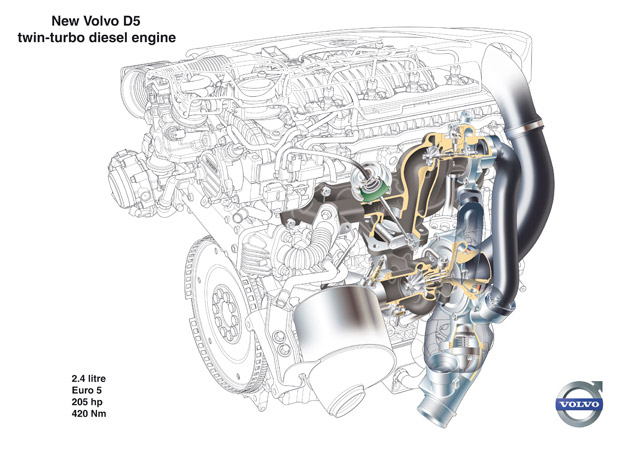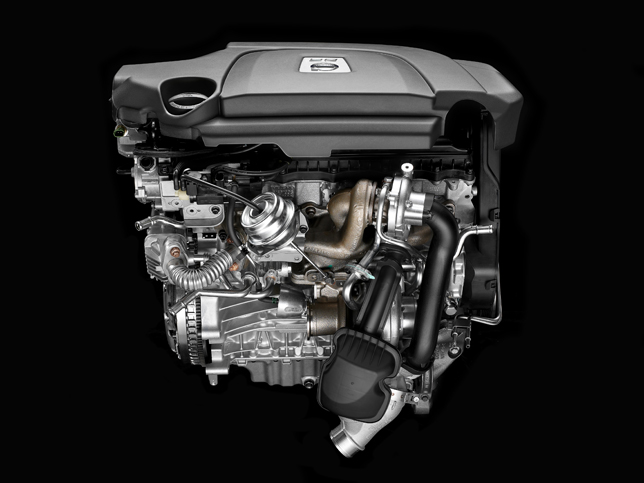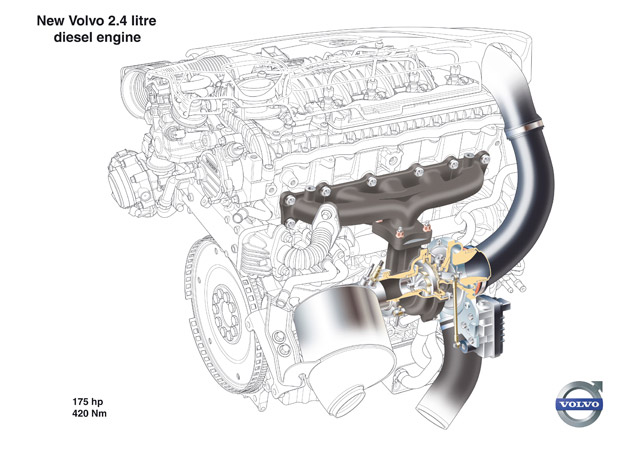Two new five-cylinder diesels from Volvo
Volvo Cars sharpens the company's diesel offer. Two entirely new five-cylinder, 2.4-litre turbo diesels give the customers the attractive possibility to combine more power with class-leading fuel consumption and CO2-emissions:
* The high-performance, twin-turbo D5 with 205 hp and 420 Nm of torque. * The medium-performance, single-turbo 2.4D with 175 hp and 420 Nm of torque.
Both engines are available in the Volvo S80, Volvo V70, Volvo XC60 and Volvo XC70 from the spring of 2009.
"This is yet another step in our determination to reduce the combustion engine's environmental impact, at the same time as we give customers truly quiet and sophisticated engines with excellent performance," says Derek Crabb, Vice President, Powertrain Engineering at Volvo Cars.
The high-performance D5-engine has already been introduced in the Volvo S80 and it will be available in the Volvo V70, Volvo XC60 and Volvo XC70 from the spring of 2009.


The performance and driveability requirements in the high-performance D5-engine have been solved with twin turbochargers of different sizes that operate in sequence to provide added power within a broader rev range. The result is alert response and rapid acceleration at all speeds, with very smooth power delivery between the turbo ranges.
This twin-turbo technology in the D5 has also made it possible to introduce higher levels of exhaust gas recirculation (EGR) across a wider rev range than before. This harnesses the two turbochargers' different properties optimally to deliver a combination of high performance and low fuel consumption that is bidding for the title of best in class.
The advanced fuel injection technology uses piezoelectric fuel injectors. This provides precise distribution of the atomised fuel in the combustion chamber, resulting in efficient combustion and low emissions. At the same time, this technology and the efficient combustion create a pleasant sound bearing a closer resemblance to the elegant note of a six-cylinder petrol engine.
Together, the high-tech solutions contribute to the excellent fuel consumption (EU Combined) figures:
* 6.2 litres/100 km (164 g/km) in the S80. * 6.4 litres/100 km (169 g/km) in the V70. * 7.0 litres/100 km (185 g/km) in the XC60 (preliminary). * 7.0 litres/100 km (185 g/km) in the XC70 (preliminary).
The single-turbo 2.4D - focus on fuel economy The single-turbo 2.4D will be available in the Volvo S80 and Volvo V70 as well as in front-wheel-drive versions of the Volvo XC60 and Volvo XC70 from the spring of 2009. The engine has been optimised with low fuel consumption in sharp focus. The injection system features another type of piezoelectric fuel injectors than in the D5, aiming to cut fuel consumption through extremely rapid and precise injection sequences. The high injection pressure results in particularly effective combustion. To promote the drivability, the single turbocharger has been optimised to produce high torque from low revs.

The upgraded single-turbo 2.4D-engine gives a fuel consumption (EU Combined)of:
* 5.8 litres/100 km (154 g/km) in the S80 (preliminary). * 5.9 litres/100 km (157 g/km) in the V70 (preliminary). * 6.0 litres/100 km (159 g/km) in the XC60. * 6.0 litres/100 km (159 g/km) in the XC70.
Mutual technology The two new diesel engines share a number of technology solutions. The engines have lower compression, more efficient combustion and the latest generation of engine management. Volvo Cars' powertrain experts have reduced internal friction and pump losses in the diesel engines. The pressure drop in the intake and exhaust system has also been significantly reduced.
The new turbo diesels have also been equipped with ceramic glow plugs, a high-tech solution that delivers excellent starting properties owing to very quick warming up. They reach a temperature of 1,000 degrees Celsius in just two seconds, making the engine easy to start and cutting emissions. In certain driving conditions, such as at really low revs, the ceramic glow-plugs can also be used to increase the temperature in the cylinders, further improving combustion efficiency.






